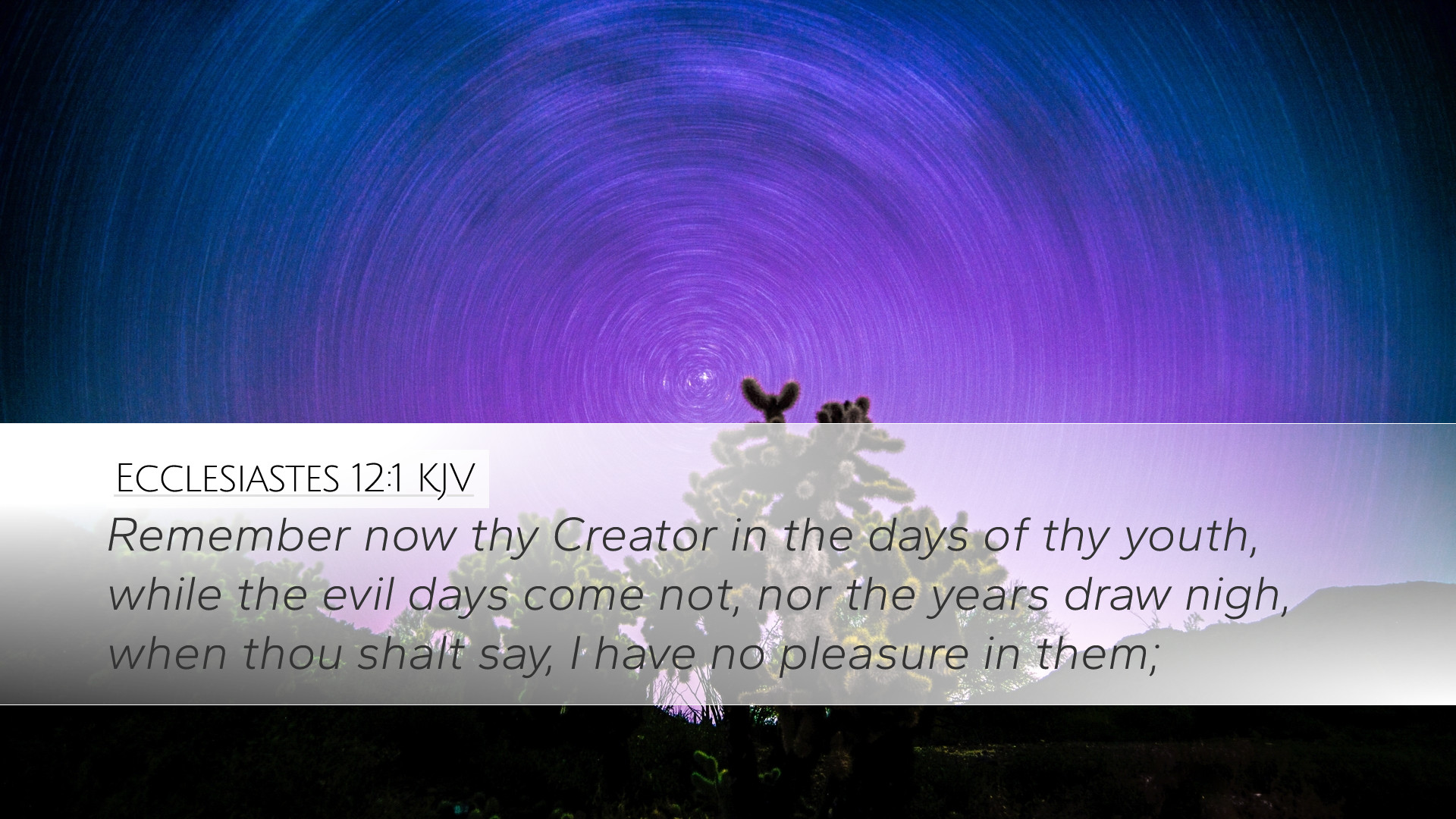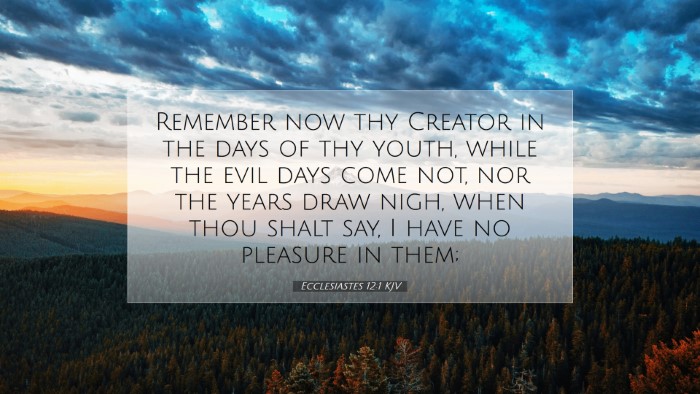Old Testament
Genesis Exodus Leviticus Numbers Deuteronomy Joshua Judges Ruth 1 Samuel 2 Samuel 1 Kings 2 Kings 1 Chronicles 2 Chronicles Ezra Nehemiah Esther Job Psalms Proverbs Ecclesiastes Song of Solomon Isaiah Jeremiah Lamentations Ezekiel Daniel Hosea Joel Amos Obadiah Jonah Micah Nahum Habakkuk Zephaniah Haggai Zechariah MalachiEcclesiastes 12:1
Ecclesiastes 12:1 KJV
Remember now thy Creator in the days of thy youth, while the evil days come not, nor the years draw nigh, when thou shalt say, I have no pleasure in them;
Ecclesiastes 12:1 Bible Commentary
Commentary on Ecclesiastes 12:1
Ecclesiastes 12:1 (KJV): "Remember now thy Creator in the days of thy youth, while the evil days come not, nor the years draw nigh, when thou shalt say, I have no pleasure in them."
Introduction
In this final chapter of Ecclesiastes, the Preacher, who traditionally is understood to be Solomon, draws his audience's attention to the importance of remembering the Creator. The verse serves as a poignant reminder to individuals, urging them to reflect on their relationship with God early in life. The profound implications of this verse resonate through the ages, providing integral lessons for every believer.
The Call to Remember
The phrase "Remember now thy Creator" is a clear imperative, emphasizing the necessity of an active and conscious acknowledgment of God.
- Matthew Henry highlights that the act of remembrance implies not only mental recognition but also a life lived in accordance with God's will. It is an invitation to engage in a fulfilling relationship with the Almighty, which is foundational to a meaningful life.
- Albert Barnes notes that the emphasis on "now" stresses urgency. The Preacher implores us to not postpone this remembrance but to make it a priority early in life.
- Adam Clarke suggests that turning to God in youth is essential since it establishes a course that helps avoid the pitfalls of sin that often ensnare the hearts of the unguarded.
The Context of Youth
The mention of "the days of thy youth" emphasizes a critical time in life. It is during youth that individuals often form their character and values.
- According to Matthew Henry, youth is a time characterized by vigor and enthusiasm; thus, it is the optimal period to solidify one’s commitment to God.
- Albert Barnes adds that this period of life is when individuals are most impressionable, and the decisions made can lead to either fruitful paths or regrettable consequences.
- Adam Clarke asserts that cultivating a relationship with God during these formative years offers the greatest opportunities for spiritual growth, thereby enriching one’s later years.
Warning Against Future Dangers
The passage warns against "the evil days" and the inevitable aging process, which may lead to a lack of pleasure in life. This reflection highlights a fundamental truth about human existence—the inevitability of aging and the associated struggles.
- Matthew Henry interprets "evil days" as those times of suffering and challenge when life’s burdens become heavier and pleasures diminish. It is within this context that remembering the Creator becomes all the more crucial.
- Albert Barnes remarks on how the joys of youth are temporary, often leading to trails of disappointment in later years, thus reinforcing the need for a personal and committed relationship with God from an early age.
- Adam Clarke expounds upon the spiritual decline that often accompanies age; thus, the reminder to "remember" serves as a protective measure against spiritual apathy as one grows older.
The Closing Reflection on Pleasure
The conclusion of the verse—“when thou shalt say, I have no pleasure in them”—is a sobering reminder of the fleeting nature of earthly joy. The Preacher indicates that without the mindfulness of God, life may become void of meaning as age approaches.
- Matthew Henry points out that true pleasure comes from a godly life, whereas those who neglect God may find their later years filled with regret and empty pursuits.
- Albert Barnes stresses that with the passing of time, the allure of worldly pleasures fades, and without awareness of God, one is left with spiritual emptiness.
- Adam Clarke underscores the tragic realization that many discover during their twilight years—the absence of lasting joys outside of a relationship with their Creator.
Concluding Thoughts
Ecclesiastes 12:1 encapsulates a profound spiritual principle: to remember the Creator early and consistently throughout one’s life. The integration of insights from respected public domain commentaries reveals that this call to remembrance is not only a personal exhortation but also a communal one, echoing through generations.
As scholars, students, and pastors engaged in theological reflection, it is imperative to recognize the depth of this scriptural guidance. A life rooted in the remembrance of God during youth promises a fulfilling journey, rich with meaning even amidst the inevitable challenges of life.


